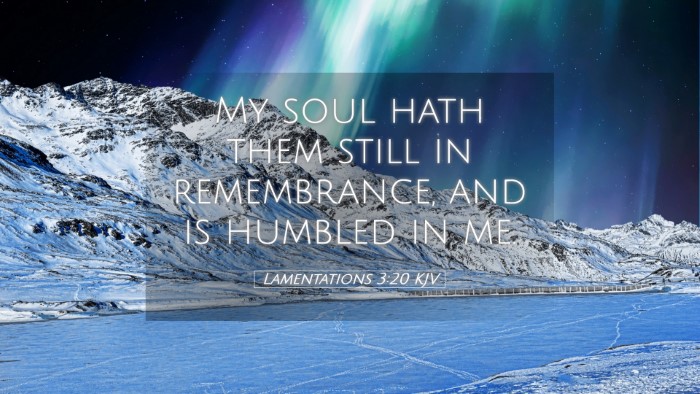Lamentations 3:20
Verse: "My soul hath them still in remembrance, and is humbled in me."
Commentary Overview
The Book of Lamentations is a profound and poignant expression of sorrow and lament for the destruction of Jerusalem. Chapter 3, where we find verse 20, presents a deep introspection and struggle with despair yet hints at hope. The theological implications of this verse invite pastors, theologians, and scholars to reflect on the nature of suffering, remembrance, and humility in the human experience.
Insight from Matthew Henry
Matthew Henry highlights the significance of remembrance in this verse. He points out that the phrase "my soul hath them still in remembrance" indicates a deliberate reflection on the sorrows and afflictions experienced. In times of suffering, believers are called to confront their pain, and in doing so, they may encounter a deepened humility. Henry emphasizes:
- Remembrance of past troubles can lead to spiritual growth and awareness of God's presence in trials.
- Humility is presented as a response to our afflictions, pushing believers to recognize their dependence on God.
He cautions, however, that while remembrance is important, it should not lead to despair. Instead, it should direct one's heart towards God's mercy, which is an underlying theme in the entire chapter.
Albert Barnes' Perspective
Albert Barnes provides a critical interpretation of Lamentations 3:20 by examining the emotional state of the speaker. Barnes notes that the speaker's soul, burdened with memories of suffering, finds it difficult to escape from the weight of grief:
- He underscores the importance of acknowledging one's feelings and the reality of suffering.
- Barnes points out that the text reveals the conflict between despair and hope; the act of remembering is both painful and necessary for healing.
Barnes suggests that this humble state is a preparatory step for receiving God’s comfort and restoration. The acknowledgment of sorrow allows for a foundation to build hope, signifying that those in despair must process their grief in God’s presence.
Adam Clarke's Analysis
Adam Clarke emphasizes the theological depth of this verse, exploring the implications of humility in the face of remembrance. He elaborates on how the weight of grief can lead to a personal confrontation with one's spiritual state:
- Clarke argues that "is humbled in me" signifies a recognition of personal failure and the need for divine intervention.
- This humility becomes a path to restoration, as it opens the heart to God's mercy, which is crucial for healing.
Moreover, Clarke notes that the act of remembrance should lead believers to seek reconciliation with God. The recognition of one’s suffering, when directed towards Him, can transform mourning into a powerful testimony of God's faithfulness.
Bridging Theology and Life
The introspective nature of Lamentations 3:20 holds significant implications for pastoral care and theological education. As believers engage with their suffering:
- The act of remembering should not lead to stagnation in sorrow but rather inspire an active pursuit of God’s grace.
- Understanding the role of humility helps individuals admit their need for divine support and allows for spiritual renewal.
For pastors, this verse serves as an excellent springboard for counseling those in grief. It highlights the importance of acknowledging pain while simultaneously guiding individuals towards hope in God.
Conclusion
Lamentations 3:20 invites an in-depth exploration of the relationship between suffering, remembrance, and humility. The insights gathered from public domain commentaries by Matthew Henry, Albert Barnes, and Adam Clarke illustrate the complexity of this verse. They collectively underscore that while suffering is an integral part of the human experience, it is within that suffering that we often find the pathway to a more profound encounter with our Creator.
As the journey of lamentation unfolds, believers are reminded that their grief, when submitted to God, can lead to transformation and renewal.


